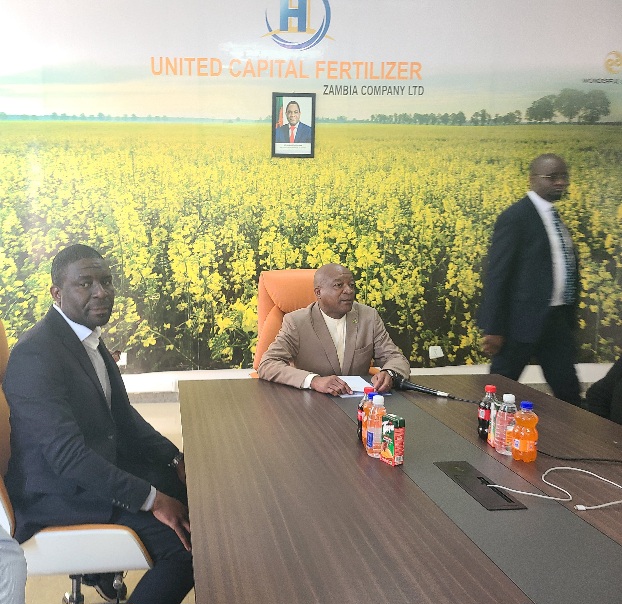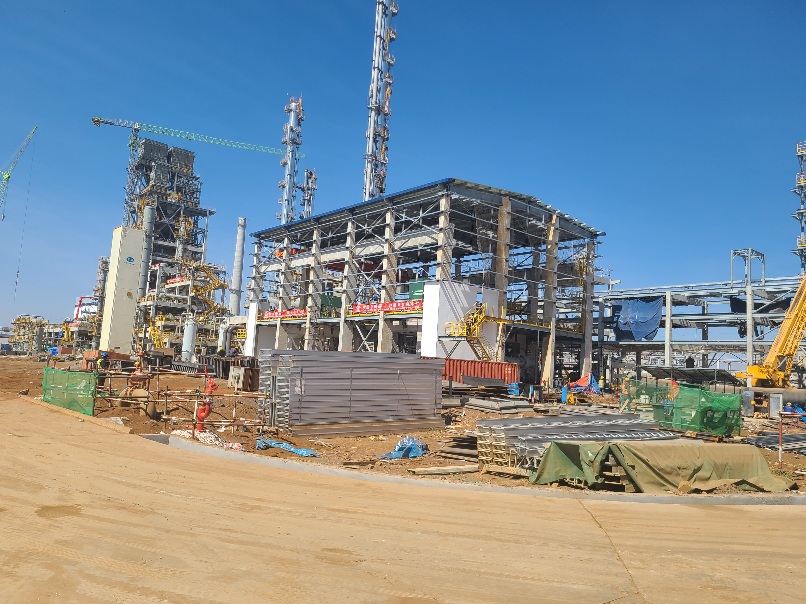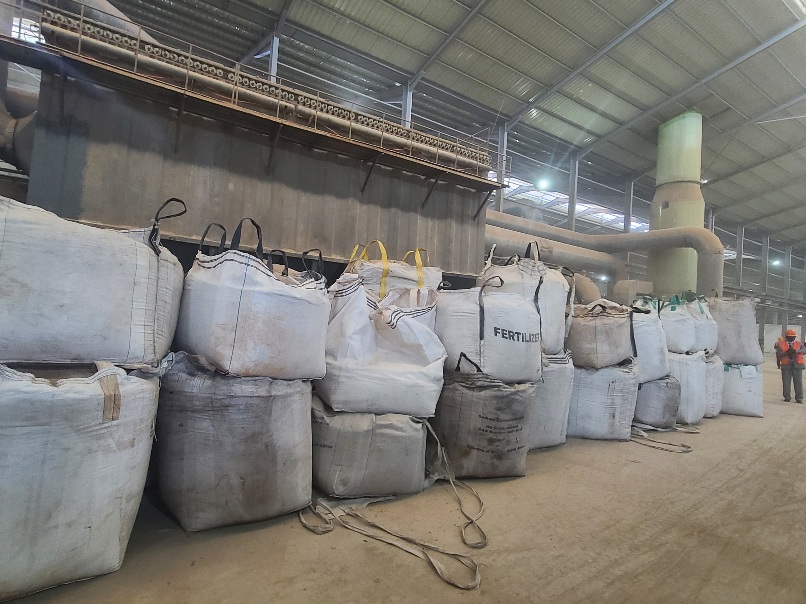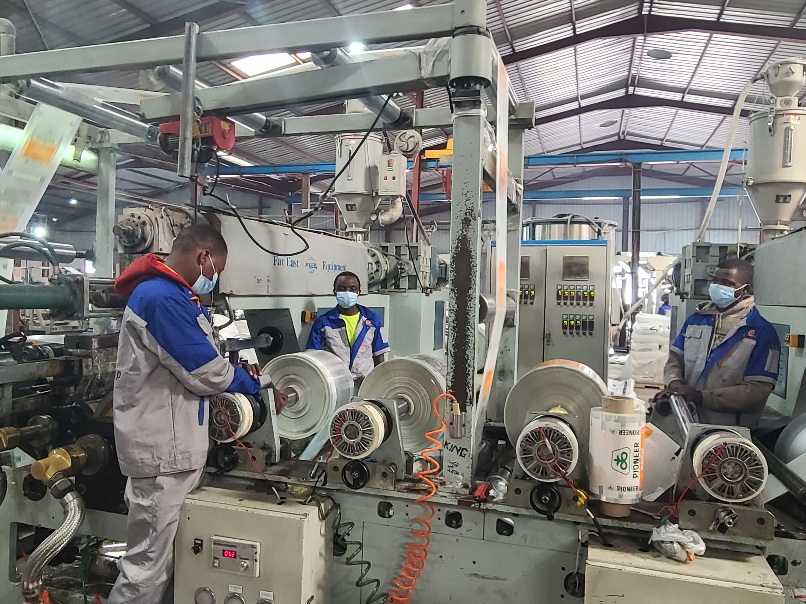Building Zambia’s Talent
 Preparing Zambian engineers for the $2 billion fertilizer facility.
Preparing Zambian engineers for the $2 billion fertilizer facility.By Francis Maingaila
LUSAKA, Zambia – 24 July 2025
The Zambian government has urged immediate and strategic collaboration between the country’s public universities and the private sector to ensure the development of a homegrown cadre of qualified chemical engineers capable of managing large-scale industrial operations such as the $2 billion United Capital Fertilizer plant — a subsidiary of the Wonderful Group of Companies.
Minister of Education Douglas Siakalima, speaking during a guided tour of the ammonia and urea plant located in Lusaka’s industrial area, said it is no longer sustainable for Zambia to rely on expatriate expertise to manage critical investments, particularly in the industrial and agricultural sectors, which are central to the country’s economic transformation agenda.

“This company alone requires around 400 chemical engineers, and as the sector expands, that number may exceed a thousand. We must act now to ensure our young people are adequately prepared to take on these roles,” Siakalima said.
He revealed that the Ministry of Education is in the final stages of negotiating a Memorandum of Understanding (MoU) with the Wonderful Group and Zambia’s public universities — particularly the University of Zambia (UNZA), Copperbelt University, and Mukuba University — to facilitate hands-on industrial training for students.
He said the partnership is intended to close the gap between academic knowledge and industry requirements.
“This agreement must be treated with the urgency it deserves. With over six million children currently in school thanks to the free education policy, we anticipate a surge in university graduates over the next 10 to 20 years. It is our responsibility to ensure they are industry-ready,” he emphasized.
The minister further encouraged the Wonderful Group to strengthen its collaboration with Zambia’s higher learning institutions to ensure that future graduates possess both theoretical grounding and practical skills to lead the country's industrial development.
 Siakalima commended the company’s ongoing investment in Zambia and emphasized that projects of this magnitude should not continue to depend on foreign expertise.
Siakalima commended the company’s ongoing investment in Zambia and emphasized that projects of this magnitude should not continue to depend on foreign expertise.“The government wants every Zambian to tangibly benefit from such investments. Let us leverage the presence of expatriates to train and empower our own people while we still can,” he said.
He further noted that the expansion of fertilizer production at United Capital Fertilizer aligns with the government’s commitment to enhancing agricultural productivity and national food security — with the added advantage of positioning Zambia as a regional exporter.
“This plant has the capacity not only to meet domestic fertilizer needs but to supply neighbouring countries such as Zimbabwe, Malawi, Angola, and Mozambique. This is the kind of industrialisation we envision under President Hichilema’s leadership,” he said.
 The call for robust industry-academia engagement came as the Wonderful Group celebrated 15 years of operating in Zambia. The ammonia and urea facility is now regarded as one of the largest of its kind in Southern Africa.
The call for robust industry-academia engagement came as the Wonderful Group celebrated 15 years of operating in Zambia. The ammonia and urea facility is now regarded as one of the largest of its kind in Southern Africa.Siakalima concluded the tour by underlining the importance of peace and political stability in attracting meaningful investment and achieving sustainable national development.
“Without peace, development is impossible. Our ability to maintain peace is the reason investors like the Wonderful Group continue to believe in Zambia,” he said.
Siakalima also praised the Wonderful Group’s decision to work with public institutions as a model of responsible corporate citizenship contributing to national development.
“This is not just business — it’s about building local capacity, creating employment, boosting exports, and expanding our economy. What the Wonderful Group is doing is truly wonderful for Zambia,” he said.
He pledged to return for another visit once the plant reaches full commissioning and expressed optimism that more companies would emulate this model by forming meaningful partnerships with Zambia’s public universities.
Siakalima lauded the company for customizing its fertilizer products to match the unique soil profiles across the country’s provinces — including Southern, Central, Western, and Northern. He described the tailored approach as both technologically advanced and essential for ensuring agricultural success.
“The fertilizers being produced here are not generic. It is adapted to specific soil conditions found in different regions of our country. That’s a significant technological milestone in our agricultural sector,” Siakalima said.
He added that the plant’s rapid expansion moves the country closer to meeting the country’s ambitious target of producing 10 million metric tonnes of fertilizer annually.
“With current output already at 3.6 million tonnes, and the pace at which we’re growing, we could soon reach six, seven, or even the full ten million. This would eliminate our dependence on imports and establish us as a dominant exporter,” he said.
Earlier, Acting Chief Executive Officer of the Wonderful Group, Roy Mwamba, welcomed the minister’s visit, describing it as both an endorsement of the company’s efforts and a timely opportunity to reinforce strategic collaboration between government, academia, and industry.
“We are extremely grateful that you’ve made time to visit us and witness firsthand the progress of our ammonia and urea plant. This partnership with the Ministry of Education and public universities is critical for our long-term goals,” Mwamba said.
He explained that while the plant is currently being operated with the assistance of an Engineering, Procurement and Construction (EPC) contractor who provides foreign staff, the arrangement is only transitional and not viable for long-term national industrialisation.
“That’s why we are actively engaging public universities to develop a sustainable succession plan. We want to see Zambian students trained, mentored, and eventually take over the plant’s operations entirely,” he said.
He noted that the initial collaboration would focus on Copperbelt University but expressed hope that the initiative would expand to include other academic institutions as the programme evolves.
The United Capital Fertilizer plant currently produces 800,000 metric tonnes of fertilizer annually — more than double Zambia’s national requirement of 300,000 metric tonnes. The excess is exported to at least five regional countries, generating valuable foreign exchange and reinforcing Zambia’s role as a regional agricultural input supplier.
Mwamba echoed the minister’s sentiment, stressing the importance of aligning academic curricula with industrial needs.
“We want to work with government to help universities revise their training programmes so that graduates are well-suited for our operations. Our growth as a company must translate into opportunities for the Zambian people,” Mwamba said.
He added that the company’s ongoing expansion has the potential to reduce import dependence, lower production costs for local farmers, and create thousands of direct and indirect jobs in Zambia’s agro-industrial sector.



Comments
Post a Comment